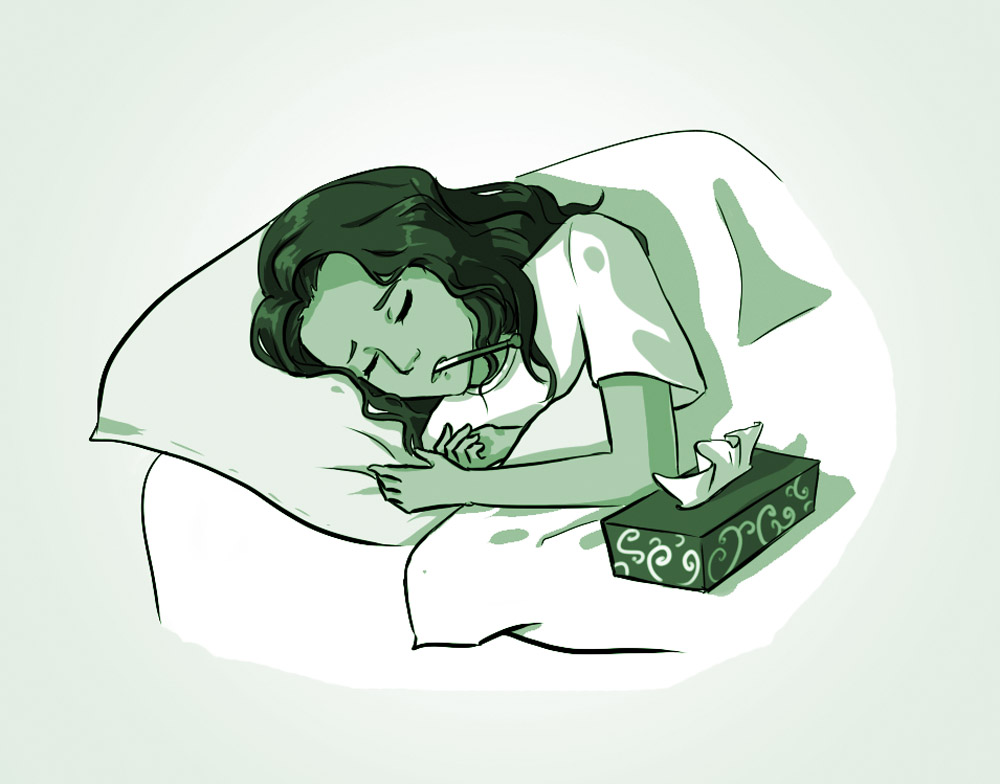

As predicted by local health officials, the seasonal flu will be reaching its peak in California this week, accompanying 30 other states across the nation also reporting widespread illness. At Aragon High School, it removes 33 students on a typical day in the month of January. Usually reaching a peak in January or February, this contagious respiratory illness infects five to 20 percent of the United States population. So far, it has killed five people in California alone.
Aileen Scatena, who works in the attendance office, has noticed a gradual increase in these numbers, especially in the last two weeks. In regards to the school’s flu policy, she states, “Every day you’re sick, your parents should call. If they forget to, they have to send a note when you return as part of the state’s education code. Then, if they are out for five days, the state requires them to have a doctor’s note when they return. And one of the most important things is they’re supposed to be fever free, without medication, for at least 24 hours before returning to school… because even after medication, you’re still contagious. And that’s what we don’t want, kids coming back and starting the domino effect.”
According to the Centers for Disease Control and Prevention (CDC), in a matter of four weeks, flu-like symptoms have climbed from 2.8 to 5.6 percent in comparison to only a 2.2 percent peak rate during the “mild” flu season last year. The CDC reports that of 135 million vaccines produced, 128.1 million have been shipped with 112 million already being administered, making the vaccine scarcer.
Sophomore Susan Rodriguez-Miranda was quick to take the flu shot. She says, “It’s just something that is really important to stop the spread of the flu… and definitely should be taken every year.”
Junior Travis Kwee, who recently recovered from the flu says, “I got the flu shot about a week after I recovered. I was supposed to get it weeks earlier, but it was never convenient.”
However, illnesses are not the only conflicts associated with the flu season. As reported by the California Department of Public Health, many cities cannot administer vaccines until their drug license verifications are renewed. As a result, the lack of health departments offering immunizations, in Sacramento, California for example, cannot answer to the overwhelming demand of childhood immunizations as the flu spreads more rapidly by the day. Poison control networks also report as the number of flu cases and other over-the-counter medications increase, there has also been more accidental overdose.
Recently, flu vaccinations have been made more accessible with pharmacy “drive-thru.” Many can get their flu shot while in their car through a certified drive-thru clinic on school campuses.
Offering three different types of vaccinations through either injection or inhalation, doctors usually recommend a single dosage especially to children younger than nine years of age receiving influenza vaccination for the first time. Generally, pharmacies make vaccines available starting in August or September through May.
On the other hand, the Journal of Autism and Developmental Disorders have reported a limited supply, which may not be the only concern parents have with the flu vaccine. Recently, doctors found that women with influenza while pregnant are twice as likely to have a child diagnosed with autism. Doctors also observed that fevers lasting a week or longer increased the likelihood to three times as likely to have an autistic child. Although the cause of this is unknown, doctors believe the mother’s weakening immune system while fighting the flu can affect the child’s brain development. Together, these precautions further encourage people, especially pregnant women, to get the flu vaccine.
Senior Lauren Chan says, “I don’t see why people wouldn’t get a flu shot—unless you are afraid of needles or you can’t afford it.”
In recovering from the flu, aside from getting plenty of rest and drinking plenty of fluids, Rodriguez-Miranda and Chen have their own family remedies. Rodriguez-Miranda eats oranges and other citrus fruits and Chen finds a mixture of brown sugar, hot water, and ginger very effective against a cough.
Kwee says, “I slept, kept hydrated and warm, and read a 600 page novel. It could have been worse.”
Health aid Lesley Franco says, “We encourage [students] to wash their hands, get plenty of sleep, and go home if they don’t feel well at any time because we don’t want them to spread it around. So if you’re not feeling well, it’s best to stay home.”
